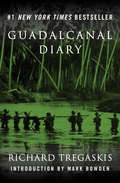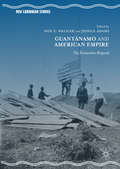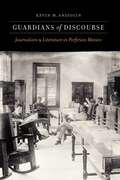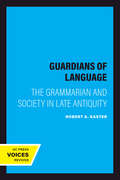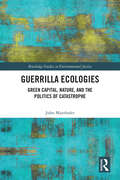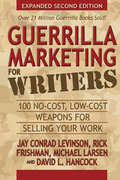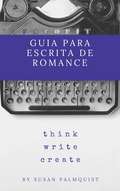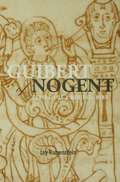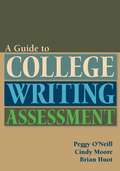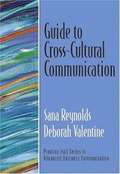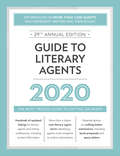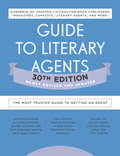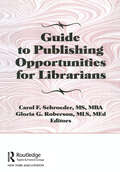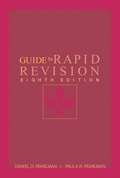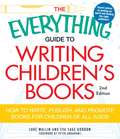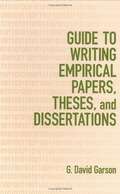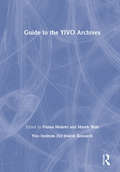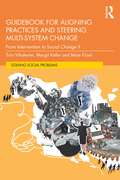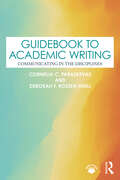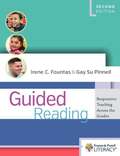- Table View
- List View
Guadalcanal Diary: Guadalcanal Diary, Invasion Diary, And John F. Kennedy And Pt-109
by Richard Tregaskis#1 New York Times Bestseller: A &“superb&” eyewitness account of one of the bloodiest and most pivotal battles of World War II (Mark Bowden, author of Black Hawk Down). On August 7, 1942, eleven thousand US Marines landed on Tulagi and Guadalcanal Islands in the South Pacific. It was the first major Allied offensive against Japanese forces; the first time in history that a combined air, land, and sea assault had ever been attempted; and, after six months of vicious fighting, a crushing defeat for the Empire of Japan and a major turning point in the Pacific War. Volunteer combat correspondent Richard Tregaskis was one of only two journalists on hand to witness the invasion of Guadalcanal. He risked life and limb to give American readers a soldier&’s experience of the war in the Pacific, from the suffocating heat and humidity to the unique terror of fighting in tall, razor-sharp grass and in crocodile-infested jungle streams against a concealed enemy. In understated yet graceful prose, Tregaskis details the first two months of the campaign and describes the courage and camaraderie of young marines who prepared for battle knowing that one in four of them wouldn&’t make it home. An instant bestseller when it was first published in 1943 and the basis for a popular film of the same name, Guadalcanal Diary set the standard for World War II reportage. Hailed by the New York Times as &“one of the literary events of its time,&” it is a masterpiece of war journalism whose influence can be found in classic works such as John Hersey&’s Hiroshima, Michael Herr&’s Dispatches, and Dexter Filkins&’s The Forever War. This ebook features an illustrated biography of Richard Tregaskis including rare images from the American Heritage Center at the University of Wyoming.
Guantánamo and American Empire: The Humanities Respond (New Caribbean Studies)
by Jessica Adams Don E. WalicekThis book explores the humanities as an insightful platform for understanding and responding to the military prison at Guantánamo Bay, other manifestations of “Guantánamo,” and the contested place of freedom in American Empire. It presents the work of scholars and writers based in Cuba’s Guantánamo Province and various parts of the US. Its essays, short stories, poetry, and other texts engage the far-reaching meaning and significance of Gitmo by bringing together what happens on the U.S. side of the fence—or “la cerca,” as it is called in Cuba—with perspectives from the outside world. Chapters include critiques of artistic renderings of the Guantánamo region; historical narratives contemplating the significance of freedom; analyses of the ways the base and region inform the Cuban imaginary; and fiction and poetry published for the first time in English. Not simply a critique of imperialism, this volume presents politically engaged commentary that suggests a way forward for a site of global contact and conflict.
Guardians of Discourse: Journalism and Literature in Porfirian Mexico
by Kevin M. AnzzolinDuring Porfirio Díaz&’s thirty-year rule, Mexico dealt with the press in disparate ways in hopes of forging an informed and, above all, orderly citizenry. Even as innumerable journalists were sent to prison on exaggerated and unfair charges of defamation or slander, Díaz&’s government subsidized multiple newspapers to expand literacy and to aggrandize the image of the regime. In Guardians of Discourse Kevin M. Anzzolin analyzes the role and representation of journalism in literary texts from Porfirian Mexico to argue that these writings created a literate, objective, refined, and informed public. By exploring works by Porfirian writers such as Emilio Rabasa, Ángel del Campo, Rafael Delgado, Laura Méndez de Cuenca, and Salvador Quevedo y Zubieta, Anzzolin demonstrates that a primary goal of the lettered class was to define and shape the character of public life, establish the social position of citizens, and interrogate the character of civil institutions. These elite letrados—whom Anzzolin refers to as &“guardians of discourse&”—aimed to define the type of discourses that would buttress the transformed Mexico of the Díaz regime to forge a truly national literature that could be discussed among an expanded coterie of lettered thinkers. In addition, these Porfirian guardians hoped to construct an extensive and active public able to debate political and social issues via a press befitting a modern nation-state and create a press that would be independent, illuminating, and distinguished. Through an innovative look at Mexico&’s public sphere via literary fiction in the Porfirian era, Anzzolin contributes to our knowledge of Mexican and Latin American political, cultural, and literary history in the late nineteenth and early twentieth centuries.
Guardians of Language: The Grammarian and Society in Late Antiquity (Transformation of the Classical Heritage #11)
by Robert A. KasterWhat did it mean to be a professional teacher in the prestigious "liberal schools"—the schools of grammar and rhetoric—in late antiquity? How can we account for the abiding prestige of these schools, which remained substantially unchanged in their methods and standing despite the political and religious changes that had taken place around them?The grammarian was a pivotal figure in the lives of the educated upper classes of late antiquity. Introducing his students to correct language and to the literature esteemed by long tradition, he began the education that confirmed his students' standing in a narrowly defined elite. His profession thus contributed to the social as well as cultural continuity of the Empire. The grammarian received honor—and criticism; the profession gave the grammarian a firm sense of cultural authority but also placed him in a position of genteel subordination within the elite.Robert A. Kaster provides the first thorough study of the place and function of these important but ambiguous figures. He also gives a detailed prosopography of the grammarians, and of the other "teachers of letters" below the level of rhetoric, from the middle of the third through the middle of the sixth century, which will provide a valuable research tool for other students of late-antique education.
Guerras del interior
by Joseph Zárate"Los verdaderos conflictos sociales y ambientales no suceden allá afuera, en las carreteras bloqueadas y las marchas multitudinarias, suceden primero en nuestro fuero interno, en lo que unos llaman alma y otros, conciencia." Premio Ortega y Gasset 2016 Premio Gabriel García Márquez de Periodismo 2018 Luego de volver a sus raíces asháninkas, Edwin Chota combate la tala ilegal en la comunidad amazónica de Saweto hasta que unos traficantes de madera lo asesinan a balazos. Máxima Acuña, agricultora y pastora de los Andes de Cajamarca, se resiste a abandonar la que considera su propiedad pese a la presencia del proyecto minero Conga, que busca extraer oro en los mismos linderos. Osman Cuñachí, de once años, aparece bañado en petróleo en una foto que recorre el mundo y da cuenta del derrame de que contaminó la comunidad de Nazareth y el río donde los awajún nadaban y pescaban. Escritas con rigor periodístico y pulso literario, estas crónicas de Joseph Zárate -galardonadas con el Premio Ortega y Gasset 2016 y el Premio Gabriel García Márquez 2018- no solo buscan denunciar las guerras sociales, económicas, políticas y ambientales que explotan en el interior del Perú. También iluminan las guerras personales, psicológicas y emocionales de hombres y mujeres que, por distintas circunstancias, deciden defender y conservar sus tierras, costumbres e identidades. ¿Qué somos capaces de hacer -como individuos, como sociedad- en nombre de aquello que llamamos "progreso"?
Guerrilla Ecologies: Green Capital, Nature, and the Politics of Catastrophe (Routledge Studies in Environmental Justice)
by John MaerhoferThis book intervenes in contemporary debates about climate activism, militancy, and strategy that have been gathering force in radical ecological circles. It responds to some of the urgent questions about utilizing militancy as part of the overall effort to foster an ecosocialist society. Building upon the crucial work of scholars and activists from the 1970s to the present, such as Carolyn Merchant, Ursula Heise, Raj Patel, Joan Martinez Alier, Neil Smith, and Mark Dowie, this book discusses and regenerates key principles of guerrilla ecology. It presents a significant critique of green capital and its impact on the shape of environmental and climate justice movements. From car manufacturers dedicating profits to reforestation, to big oil conglomerates funneling money into universities that are developing techno-fixes which may stave off ecological disaster, green capital has become the mainstay of contemporary cultural, political, and economic reproduction – aiming to fuse profitability and sustainability. The book brings together discussion on key topics in a range of contexts including biopiracy and biocolonialism, indigenous resistance, extractivism, anti-imperialism, ecotage, and eco-militancy. It will attract scholarly readers from diverse spaces in the environmental humanities, environmental and climate justice, radical ecology, and philosophy.
Guerrilla Marketing for Writers: 100 No-Cost, Low-Cost Weapons for Selling Your Work (Guerilla Marketing Press)
by Jay Conrad Levinson Rick Frishman Michael Larsen David L. HancockBecause the battle begins before a book even hits the selves, an author needs every weapon to get ahead of the competition. Guerrilla Marketing for Writers is packed with proven insights and advice, it details 100 “Classified secrets” that will help autho
Guia para Escrita de Romance: Pense, Escreva, Crie
by Susan PalmquistVocê sabia que escrever um livro está no ranking das três primeiras coisas que as pessoas querem fazer durante a vida? Talvez esteja na sua também, ou talvez você sempre tenha pensado em escrever um romance ou ter uma história que precise ser contada. Escrever um livro é mais difícil do que você pensa… publicar mais difícil ainda, então eu juntei o que eu chamo de “Guia para Escrita de Romance”. Ele irá mostrar-lhe como desenvolver bons hábitos de escrita desde o primeiro dia, como começar o livro e terminar, mas acima de tudo, compartilhar com você segredos sobre o que faz uma grande história, grandes personagens e um enredo que terá um editor ou agente pensando que você escreve há anos. Embora não seja um tipo de método que oferece atalho ou uma manivela que deixa o livro pronto em 30 dias, é fácil seguir o modelo em todo o processo de criação do romance. Algo que eu desejei ter quando comecei minha própria jornada de escrita. Este modelo irá mostrar-lhe: Como traçar as personagens; Como criar personagens que os leitores vão adorar; Como escolher a pessoa certa para contar a história; Como escrever diálogos para que os seus leitores pensem que estão escutando uma conversa real; Como mostrar e não contar; Como ter certeza de que seu personagem tem um objetivo e há bastante conflito em toda a sua história; Maneiras de aumentar o impacto emocional; E muito mais ...
Guibert of Nogent: Portrait of a Medieval Mind
by Jay RubensteinThis is a well written and valuable study of the life of a familiar but still somehow shadowy figure and an important contribution to medieval intellectual history, with insights into the meaning of the twelfth-century renaissance, the monastic mindset, the invention of psychological thought, the birth of the university, and the historiography of the Crusades.
Guide to College Writing Assessment
by Peggy O'Neill Cindy Moore Brian HuotWhile most English professionals feel comfortable with language and literacy theories, assessment theories seem more alien. English professionals often don’t have a clear understanding of the key concepts in educational measurement, such as validity and reliability, nor do they understand the statistical formulas associated with psychometrics. But understanding assessment theory—and applying it—by those who are not psychometricians is critical in developing useful, ethical assessments in college writing programs, and in interpreting and using assessment results. A Guide to College Writing Assessment is designed as an introduction and source book for WPAs, department chairs, teachers, and administrators. Always cognizant of the critical components of particular teaching contexts, O’Neill, Moore, and Huot have written sophisticated but accessible chapters on the history, theory, application and background of writing assessment, and they offer a dozen appendices of practical samples and models for a range of common assessment needs. Because there are numerous resources available to assist faculty in assessing the writing of individual students in particular classrooms, A Guide to College Writing Assessment focuses on approaches to the kinds of assessment that typically happen outside of individual classrooms: placement evaluation, exit examination, programmatic assessment, and faculty evaluation. Most of all, the argument of this book is that creating the conditions for meaningful college writing assessment hinges not only on understanding the history and theories informing assessment practice, but also on composition programs availing themselves of the full range of available assessment practices.
Guide to Cross-Cultural Communication
by Sana Reynolds Deborah ValentineThis concise, practical book will help you communicate successfully in culturally diverse workplaces at home and abroad.
Guide to Literary Agents 2020: The Most Trusted Guide to Getting Published (Market #2020)
by Robert Lee BrewerThe Best Resource Available for Finding a Literary Agent! No matter what you're writing--fiction or nonfiction, books for adults or children--you need a literary agent to get the best book deal possible from a traditional publisher. Guide to Literary Agents 2020 is your go-to resource for finding that literary agent and earning a contract from a reputable publisher. Along with listing information for more than 1,000 agents who represent writers and their books, the 29th edition of GLA includes: • The key elements of a successful nonfiction book proposal. • Informative articles on crafting the perfect synopsis and detailing what agents are looking for in the ideal client--written by actual literary agents. • Plus, a 30-Day Platform Challenge to help writers build their writing platforms +Includes 20 literary agents actively seeking writers and their writing
Guide to Literary Agents 30th Edition
by edited by Robert Lee BrewerThe Best Resource Available for Finding a Literary Agent, fully revised and updatedNo matter what you're writing--fiction or nonfiction, books for adults or children--you need a literary agent to get the best book deal possible from a traditional publisher. Guide to Literary Agents 30th edition is your go-to resource for finding that literary agent and earning a contract from a reputable publisher. Along with listing information for more than 1,000 agents who represent writers and their books, the 30th edition of GLA includes: • Hundreds of updated listings for literary agents and writing conferences • Informative articles on crafting effective queries, synopses, and book proposals (and the agent query tracker) • Plus, a 30-Day Platform Challenge to help writers build their writing platforms • Includes 20 literary agents actively seeking writers and their writing
Guide to Publishing Opportunities for Librarians
by Carol F Schroeder Gloria G Roberson Peter GellatlyThis helpful guidebook makes it easy for librarians to select the most appropriate periodical or serial for their proposed articles. A subject index with cross references ensures quick access to the alphabetically listed titles. The Guide to Publishing Opportunities for Librarians provides the following comprehensive information for each publication listed: bibliographic entry name and address of editor to whom manuscripts should besubmitted names of indexing and abstracting services which include the publication editorial aim/policy scope and content intended audience manuscript style requirements acceptance rate review procedures for submitted articles Both novice and experienced authors will be able to quickly select the most appropriate periodical or serial for proposed articles from a wide variety of publications. In addition to the more familiar organs of national library associations, societies, and library schools, the guide also includes regional publications, newsletters, bulletins, scholarly journals, interdisciplinary and general periodicals, subject-specific publications, and electronic journals. Public, academic, special, and school librarians, as well as other information specialists seeking to publish in the library science field, will find the Guide to Publishing Opportunities for Librarians a valuable tool for promoting professional development.
Guide to Rapid Revision (8th Edition)
by Daniel D. Pearlman Paula R. PearlmanThis comprehensive guide uses the most effective teaching method there is: showing, not telling. Readers are guided to solve their writing problems almost entirely by means of real-life examples.
Guide to Writing Children's Books: Second Edition (The Everything )
by Peter Abrahams Luke Wallin Eva Sage GordonWriting for kids is fun and rewarding--if you can break into the fiercely competitive world of children's book publishing. With this guide, you'll learn how to write and promote a children's book that will impress any publisher. Whether you have a basic idea or a manuscript ready to go, you'll find all you need to build a successful career as a children's book author.This clear and concise guide helps you:Formulate an original idea, create an outline, and write the bookLearn the basics of children's storytelling, from point of view to story pacingFind helpful writing workshops and conferencesDesign a winning book proposal, get an agent, and negotiate a contractCreate a marketing and publicity planUse professional and social networking sites to promote your book Full of eye-opening insider information and invaluable writing advice, this book should be on every aspiring author's bookshelf!
Guide to Writing Empirical Papers, Theses, and Dissertations
by G. David GarsonDescribes the quantitative research process--framing analytical questions, developing a comprehensive outline, providing a road map for the reader, and accessing indispensable computer and program tools. Supplies end-of-chapter checklists, extensive examples, and bibliographies.
Guide to the YIVO Archives
by Yivo Institute For Jewish ResearchYIVO, founded in 1925 in Wilno (Vilnius), is a center for scholarship on East European Jewish history, language, and culture. During the 1920s and early 1930s a network of YIVO affiliates was established across Europe and the Americas including one in New York, which became the institute's new home when YIVO was reestablished in 1940 by members of its board who had escaped from Nazi-occupied Europe.This is the first repository-level finding aid to the archives (over 1,400 collections) of the YIVO Institute for Jewish Research in New York. It includes a brief history of the institute and archives, descriptive entries on each collection, a detailed index of key words and subject headings, and information on the archive's basic services.
Guidebook for Aligning Practices and Steering Multi-System Change: From Intervention to Social Change II (Solving Social Problems)
by Margit Keller Triin Vihalemm Maie KiiselBuilding on the work of the authors’ previous volume, the Guidebook for Aligning Practices and Steering Multi‑System Change translates cutting‑edge theoretical concepts into the language and applied toolkits of change practitioners. This empirically grounded and theoretically sophisticated book provides policymakers and change‑managers methods and toolkits for conceptual modelling of change when handling cross‑sectoral issues. The authors both ‘zoom in’ to the granular unfolding change of everyday life and ‘zoom out’ to examine the ‘big picture’ of socio‑technical systems such as energy, mobility, food and healthcare. In addition to the social practice theories introduced in the first volume, the authors draw on the multi‑level perspective that underpins sustainability transition studies and combine two theories. They are also inspired by the Deep Transition concept that tackles multi‑systems change. Bridging the gap between the theorisation of sustainability transitions and practical guidelines, it will appeal to policymakers, sustainability project managers and students of management, social and political sciences, technology and innovation.
Guidebook to Academic Writing: Communicating in the Disciplines
by Deborah F. Rossen-Knill Cornelia C. ParaskevasThis innovative guidebook is an accessible and concise introduction to discipline-specific academic language. Using authentic texts written by both novice and expert writers and ‘translating’ current, corpus-based research of academic language into a practical guide, the book gives students the tools to navigate the linguistic features of various disciplines, emphasizing the humanities and sciences, but also discussing example texts from the social sciences.Organised as 11 self-contained questions that are critical to any discussion of academic language, this guide: provides specific information and detail regarding the language ‘demands’ of each discipline explains the principles underlying punctuation, the range of choices writers have and the effects of these choices on readers includes detailed linguistic guidance on how to construct effective paragraphs discusses the multiple ways attitude is expressed in academic texts includes information on citation practices With exercises and additional online resources, this guidebook provides students with a range of tools they can choose from in order to create effective texts that meet discipline and reader expectations. Accessibly written, it is an essential guide for all students in humanities and sciences writing academic texts in English.
Guided Reading: Responsive Teaching Across the Grades (2nd Edition)
by Gay Su Pinnell Irene FountasMuch has been written on the topic of guided reading over the last twenty years, but no other leaders in literacy education have championed the topic with such depth and breadth as Irene Fountas and Gay Su Pinnell. In the highly anticipated second edition of Guided Reading, Fountas and Pinnell remind you of guided reading's critical value within a comprehensive literacy system, and the reflective, responsive teaching required to realize its full potential. Now with Guided Reading, Second Edition, (re)discover the essential elements of guided reading through: a wider and more comprehensive look at its place within a coherent literacy system a refined and deeper understanding of its complexity an examination of the steps in implementation-from observing and assessing literacy behaviors, to grouping in a thoughtful and dynamic way, to analyzing texts, to teaching the lesson the teaching for systems of strategic actions a rich text base that can support and extend student learning the re-emerging role of shared reading as a way to lead guided and independent reading forward the development of managed independent learning across the grades an in-depth exploration of responsive teaching the role of facilitative language in supporting change over time in students' processing systems the identification of high-priority shifts in learning to focus on at each text level the creation of a learning environment within which literacy and language can flourish. Through guided reading, students learn how to engage in every facet of the reading process and apply their reading power to all literacy contexts. Also check out our new on-demand mini-course: Introducing Texts Effectively in Guided Reading Lessons
Guided Spelling™, [Grade 3], Student Spelling Book
by John Shefelbine Katherine Newman Developmental Studies Center StaffNIMAC-sourced textbook
Guided Spelling™, [Grade 4], Student Spelling Book
by John Shefelbine Katherine Newman Developmental Studies Center StaffNIMAC-sourced textbook
Guided Spelling™, [Grade 5], Student Spelling Book
by John Shefelbine Katherine Newman Developmental Studies Center StaffNIMAC-sourced textbook
